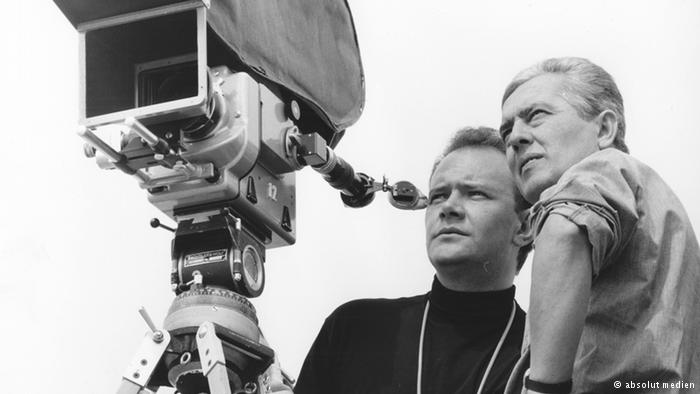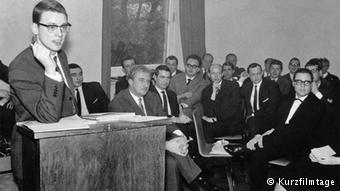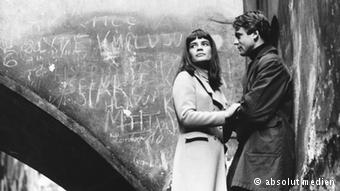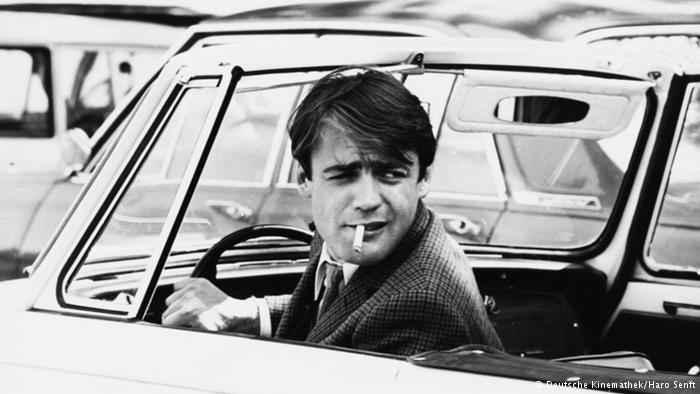DVD-tips
Between revolt and opportunism: Director Haro Senft died
Young German cinema about a man between anger and adaptation: “The gentle race” was the film debut of Haro Senft and by Bruno Ganz. Now the Film is at the Berlinale, will be shown. Senft died at 87 years of age.

The man behind the camera: Director Haro Senft (l.) in his feature debut
How is it in Germany in the Schicksalsjahr 1968 received? What did the young people and students at that time? Whereas, they refused to? The cinema of that time, but later shows us mostly images of student unrest and violent protests against the ruling Establishment. One learns a lot about the nucleus of the German left terrorism of the 1970s, encounters the RAF, Andreas Baader or Ulrike Meinhof.
“The gentle round” shows representing the Generation of the 1960s
Of course, all of these persons and events, expression of this time – and for the historian of today is of great interest. However, the Molotov-cocktail-throwing students were not for the mass, of Ulrike Meinhof, Andreas Baader and co. not to mention. The large majority of young people in the second half of the 1960s was less even rebellious. This is why movies like “The gentle round” may be much more meaningful and relevant, if a comprehensive picture of the youth of this time want to make.

Thoughtful: Bruno Ganz as Bernhard Kral
In “The gentle round” (1967), plays Bruno Ganz in his first Kinohauptrolle the young Bernhard Kral, for his studies have to cancel after a Kneipenrauferei against the stupid, brash slogans of Neo-Nazis fights back and comes to prison for it. Then distributes it in an antique store. One day he meets young Joan Benedict – played by Verena Buss know in the he falls in love with.
Film about personal happiness and professional Progress
The two become a Couple. Johanna comes from a family of entrepreneurs. In the company of the father gets Bernhard a Job, climbs to the head of Department on what Bernhard does not know: Only due to the protection by his father-in-law in spe can climb to higher positions. But Bernhard remembers the time that he is in the environment of the family, Benedict is not comfortable. The entrepreneur and his / her friends turn out to be as arrogant, autocratic people with a conservative world view.

Alexander Kluge, from the Oberhausen Manifesto
Between Bernhard and the older Generation is doing a much more noticeable crack on. It is the vielbeschriebene dig the ’68 from the older Generation, the war and national socialism was involved separates. But not everyone is, therefore, at that time radically. One can safely assume that the majority of Adolescents are more or less opportune to the System concerned. Also Bernard suits in “The gentle round” to the circumstances; even if reluctantly, and in the Knowledge of him a little with the Older combines.
Bruno Ganz shines in his debut
It draws on Haro Senft Bernhard’s character anything other than unsympathetic. On the contrary: The young Bruno Ganz gives the figure depth and equips you with the many psychological facets. It is Haro Senft highly commendable, in this Film about the Federal Republic in the 1960s with the figure of Bernhard Kral a character to give the representative for a whole Generation. A, probably very much more typical was than all the crazy Hippies and terrorists, where Film and television are so often assumed to have: “you waive the slogans, the militant gesture of the left heart, give your uncertainty, your confusion” – as the film critic Wilhelm Roth about the character Bernhard Kral in the Booklet of the DVD.

A love between the worlds: Bruno Ganz, and Verena Buss in “The gentle race”
Oberhausen Manifesto – a Declaration of war on the dusty Nachkriegskino
After his feature film debut, Haro Senft, only a single movie (for an adult audience) is rotated. Already in the early 1970s he turned to film and became one of the most prominent representatives of this most neglected of Genres. For some years he travelled for the Goethe Institute in terms of children’s film around the world. Before “The gentle round” had Senft a crucial role in the formation of the famous “Oberhausen Manifesto” in 1962, played. The 26 signatories had at that time written on the flags, the conventional, cumbersome and purely commercially oriented German Nachkriegskino with fresh ideas and a new design language to take off. Senft was one of the Central pioneers of this important movement for renewal of the German cinema: “Haro Senft was a flywheel of the Federal Republic of Filmerneuerung”, so the Filmpublizist Olaf Möller.
Haro Senft is a 1961 with “Bald”, nominated for an Oscar
Already some years earlier in 1928 as a son of German parents in Bohemia in české budějovice Director, born in different Manifestos and concept papers thoughts on the future of German cinema. These ideas were incorporated in the Oberhausen Manifesto. But Senft was one of the Quiet in the scene. So it was not he, at the short film Festival in the Ruhr city of the Text of the Manifesto read, but Alexander Kluge.

Look back: “The gentle race” with Bruno Ganz within the Berlinale international film festival-retrospective, “Germany 66”.
Senft has from the mid-1950s numerous short films staged. Largely forgotten today, the Senft of the first German filmmakers to a renewable Director-Generation and was nominated for an Oscar was: in 1961, for the short film “Bald”, the commissioning of a nuclear power plant is the topic.
Haro Senft got 2012 the Berlinale camera
Four years ago, Haro Senft at the Berlin film festival with a Berlinale camera award. He received the award from the hands of festival Director Dieter Kosslick. The Director won the prize in 2012 in Berlin, not personally accept. The moving conversation between ran and Senft in whose Munich apartment is on the DVD Edition of “The gentle round” to see. Ber of 66. Berlinale is Senfts debut one of the highlights within the Retropsketive “Germany 66”.
Haro Senft: The gentle race, Germany 1967, 89 minutes. On the DVD, there are also seven short films by the Director, including the 1961 Oscar-nominated “Bare”. Provider of the DVD: Absolut Medien.


